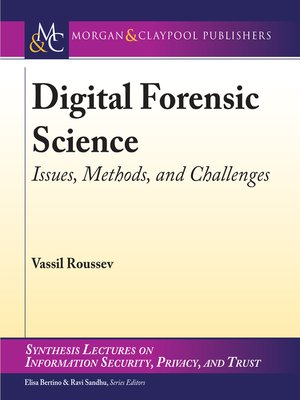Digital Forensic Science
ebook ∣ Issues, Methods, and Challenges · Synthesis Lectures on Information Security, Privacy, and Trust
By Vassil Roussev

Sign up to save your library
With an OverDrive account, you can save your favorite libraries for at-a-glance information about availability. Find out more about OverDrive accounts.
Find this title in Libby, the library reading app by OverDrive.



Search for a digital library with this title
Title found at these libraries:
| Library Name | Distance |
|---|---|
| Loading... |
Digital forensic science, or digital forensics, is the application of scientific tools and methods to identify, collect, and analyze digital (data) artifacts in support of legal proceedings. From a more technical perspective, it is the process of reconstructing the relevant sequence of events that have led to the currently observable state of a target IT system or (digital) artifacts.
Over the last three decades, the importance of digital evidence has grown in lockstep with the fast societal adoption of information technology, which has resulted in the continuous accumulation of data at an exponential rate. Simultaneously, there has been a rapid growth in network connectivity and the complexity of IT systems, leading to more complex behavior that needs to be investigated.
The goal of this book is to provide a systematic technical overview of digital forensic techniques, primarily from the point of view of computer science. This allows us to put the field in the broader perspective of a host of related areas and gain better insight into the computational challenges facing forensics, as well as draw inspiration for addressing them. This is needed as some of the challenges faced by digital forensics, such as cloud computing, require qualitatively different approaches; the sheer volume of data to be examined also requires new means of processing it.







